Leadership and Management for Service Industry: ABC Consult Report
VerifiedAdded on 2021/02/20
|13
|3015
|27
Report
AI Summary
This report, prepared for ABC Consult, analyzes leadership and management principles within the service industry, specifically using Wa-Pila Hotels as a case study. The report begins with an introduction to leadership and management, followed by an examination of classical management theories and leadership styles. It then delves into the factors influencing management styles and structures, including internal and external technological factors, employee engagement, and stakeholder relationships. The report further discusses the characteristics and skills of effective managers in the contemporary hospitality industry, differentiating between hard and soft skills and their impact. It also explores future management and leadership skills required by the service sector, including the development of analytical and communication skills. Finally, the report compares different service industry organizations' change management systems and leadership approaches.
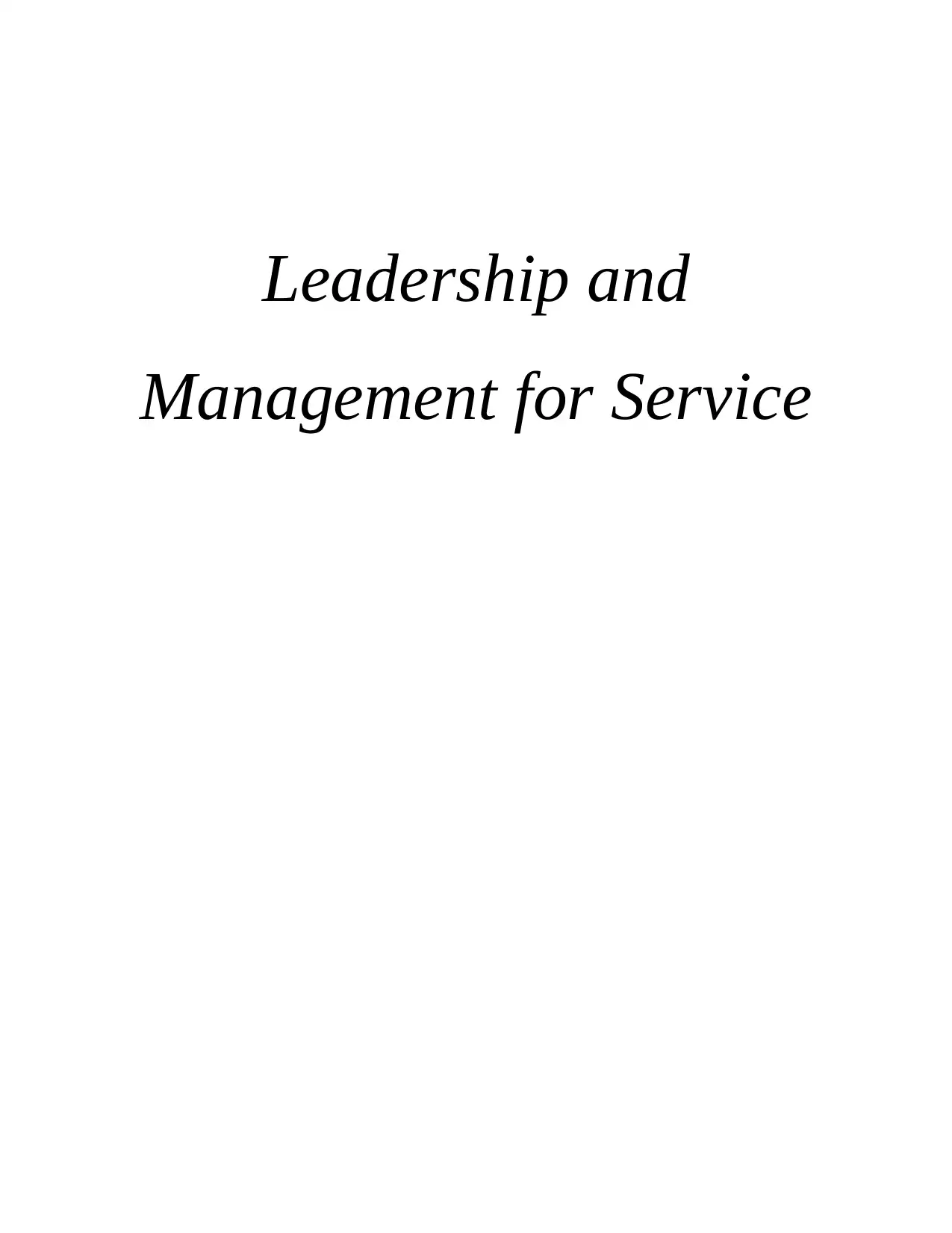
Leadership and
Management for Service
Management for Service
Paraphrase This Document
Need a fresh take? Get an instant paraphrase of this document with our AI Paraphraser
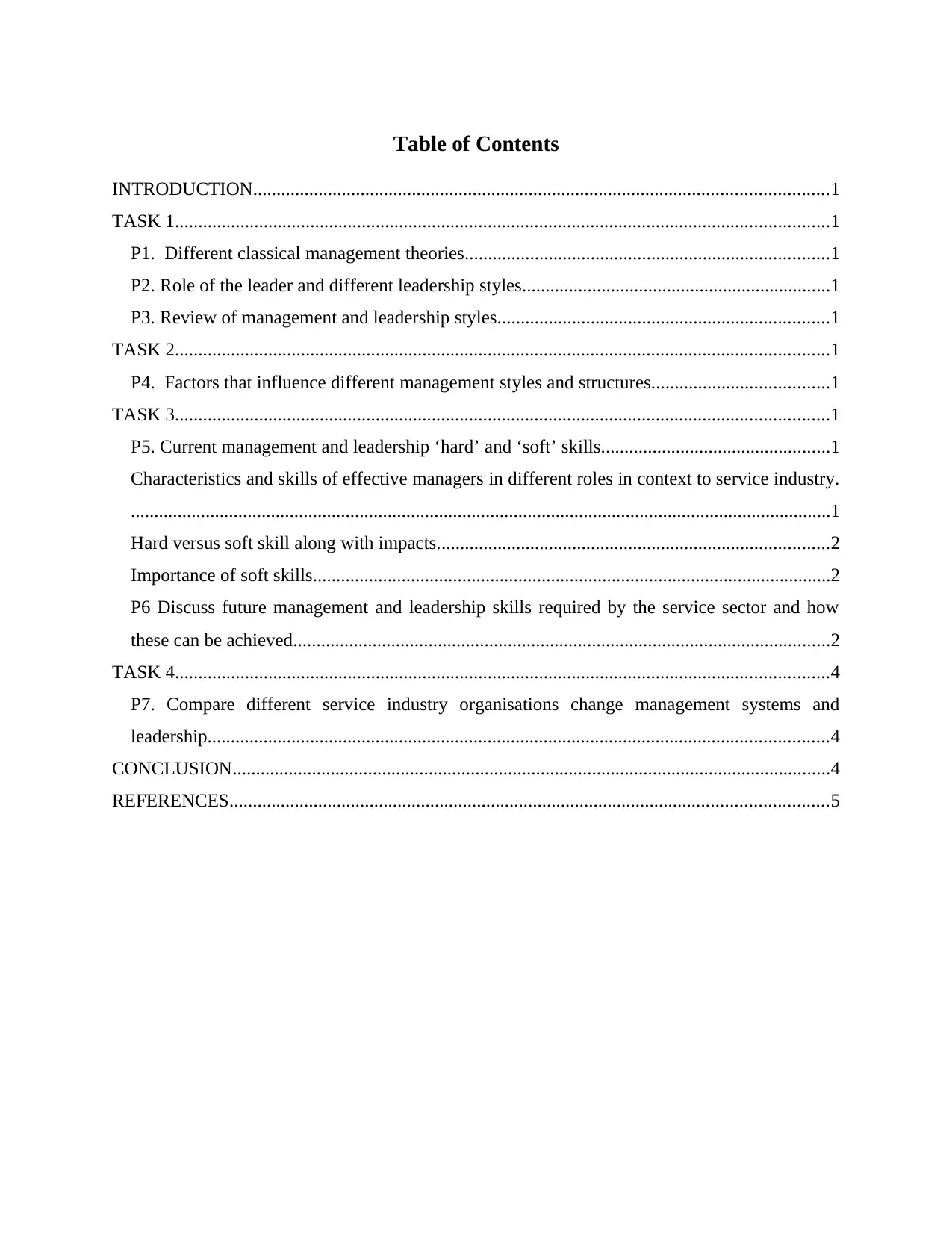
Table of Contents
INTRODUCTION...........................................................................................................................1
TASK 1............................................................................................................................................1
P1. Different classical management theories..............................................................................1
P2. Role of the leader and different leadership styles..................................................................1
P3. Review of management and leadership styles.......................................................................1
TASK 2............................................................................................................................................1
P4. Factors that influence different management styles and structures......................................1
TASK 3............................................................................................................................................1
P5. Current management and leadership ‘hard’ and ‘soft’ skills.................................................1
Characteristics and skills of effective managers in different roles in context to service industry.
......................................................................................................................................................1
Hard versus soft skill along with impacts....................................................................................2
Importance of soft skills...............................................................................................................2
P6 Discuss future management and leadership skills required by the service sector and how
these can be achieved...................................................................................................................2
TASK 4............................................................................................................................................4
P7. Compare different service industry organisations change management systems and
leadership.....................................................................................................................................4
CONCLUSION................................................................................................................................4
REFERENCES................................................................................................................................5
INTRODUCTION...........................................................................................................................1
TASK 1............................................................................................................................................1
P1. Different classical management theories..............................................................................1
P2. Role of the leader and different leadership styles..................................................................1
P3. Review of management and leadership styles.......................................................................1
TASK 2............................................................................................................................................1
P4. Factors that influence different management styles and structures......................................1
TASK 3............................................................................................................................................1
P5. Current management and leadership ‘hard’ and ‘soft’ skills.................................................1
Characteristics and skills of effective managers in different roles in context to service industry.
......................................................................................................................................................1
Hard versus soft skill along with impacts....................................................................................2
Importance of soft skills...............................................................................................................2
P6 Discuss future management and leadership skills required by the service sector and how
these can be achieved...................................................................................................................2
TASK 4............................................................................................................................................4
P7. Compare different service industry organisations change management systems and
leadership.....................................................................................................................................4
CONCLUSION................................................................................................................................4
REFERENCES................................................................................................................................5

⊘ This is a preview!⊘
Do you want full access?
Subscribe today to unlock all pages.

Trusted by 1+ million students worldwide
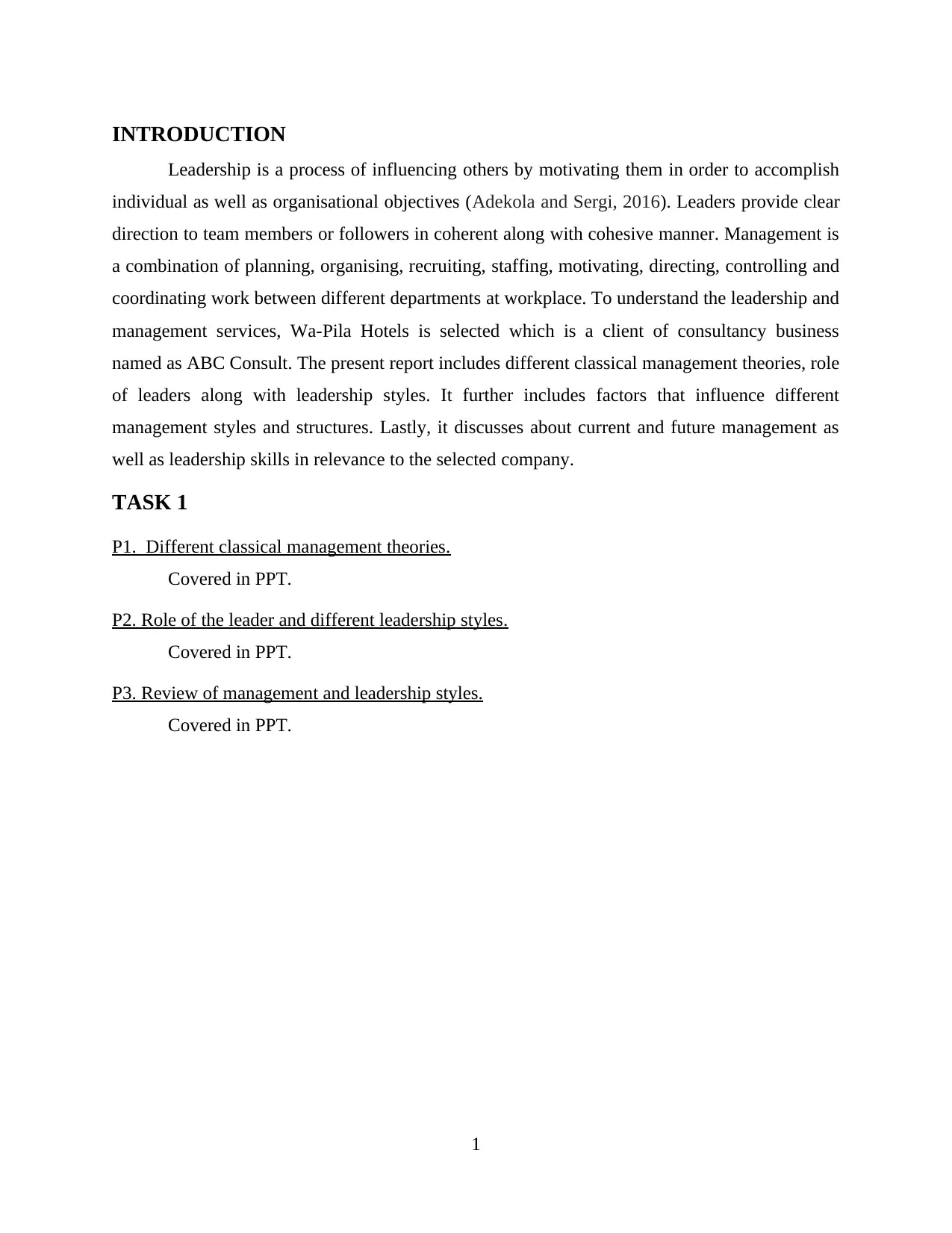
INTRODUCTION
Leadership is a process of influencing others by motivating them in order to accomplish
individual as well as organisational objectives (Adekola and Sergi, 2016). Leaders provide clear
direction to team members or followers in coherent along with cohesive manner. Management is
a combination of planning, organising, recruiting, staffing, motivating, directing, controlling and
coordinating work between different departments at workplace. To understand the leadership and
management services, Wa-Pila Hotels is selected which is a client of consultancy business
named as ABC Consult. The present report includes different classical management theories, role
of leaders along with leadership styles. It further includes factors that influence different
management styles and structures. Lastly, it discusses about current and future management as
well as leadership skills in relevance to the selected company.
TASK 1
P1. Different classical management theories.
Covered in PPT.
P2. Role of the leader and different leadership styles.
Covered in PPT.
P3. Review of management and leadership styles.
Covered in PPT.
1
Leadership is a process of influencing others by motivating them in order to accomplish
individual as well as organisational objectives (Adekola and Sergi, 2016). Leaders provide clear
direction to team members or followers in coherent along with cohesive manner. Management is
a combination of planning, organising, recruiting, staffing, motivating, directing, controlling and
coordinating work between different departments at workplace. To understand the leadership and
management services, Wa-Pila Hotels is selected which is a client of consultancy business
named as ABC Consult. The present report includes different classical management theories, role
of leaders along with leadership styles. It further includes factors that influence different
management styles and structures. Lastly, it discusses about current and future management as
well as leadership skills in relevance to the selected company.
TASK 1
P1. Different classical management theories.
Covered in PPT.
P2. Role of the leader and different leadership styles.
Covered in PPT.
P3. Review of management and leadership styles.
Covered in PPT.
1
Paraphrase This Document
Need a fresh take? Get an instant paraphrase of this document with our AI Paraphraser
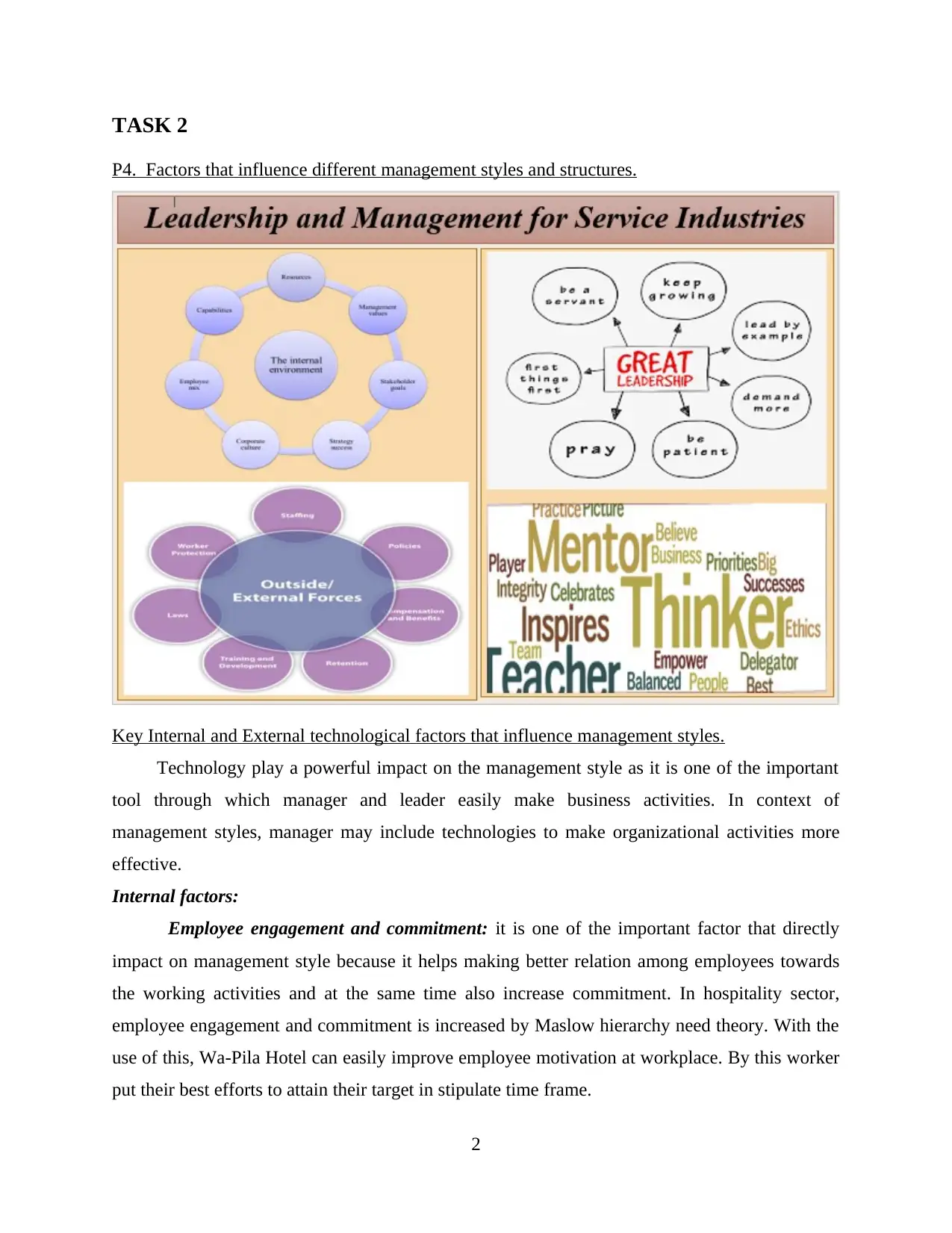
TASK 2
P4. Factors that influence different management styles and structures.
Key Internal and External technological factors that influence management styles.
Technology play a powerful impact on the management style as it is one of the important
tool through which manager and leader easily make business activities. In context of
management styles, manager may include technologies to make organizational activities more
effective.
Internal factors:
Employee engagement and commitment: it is one of the important factor that directly
impact on management style because it helps making better relation among employees towards
the working activities and at the same time also increase commitment. In hospitality sector,
employee engagement and commitment is increased by Maslow hierarchy need theory. With the
use of this, Wa-Pila Hotel can easily improve employee motivation at workplace. By this worker
put their best efforts to attain their target in stipulate time frame.
2
P4. Factors that influence different management styles and structures.
Key Internal and External technological factors that influence management styles.
Technology play a powerful impact on the management style as it is one of the important
tool through which manager and leader easily make business activities. In context of
management styles, manager may include technologies to make organizational activities more
effective.
Internal factors:
Employee engagement and commitment: it is one of the important factor that directly
impact on management style because it helps making better relation among employees towards
the working activities and at the same time also increase commitment. In hospitality sector,
employee engagement and commitment is increased by Maslow hierarchy need theory. With the
use of this, Wa-Pila Hotel can easily improve employee motivation at workplace. By this worker
put their best efforts to attain their target in stipulate time frame.
2
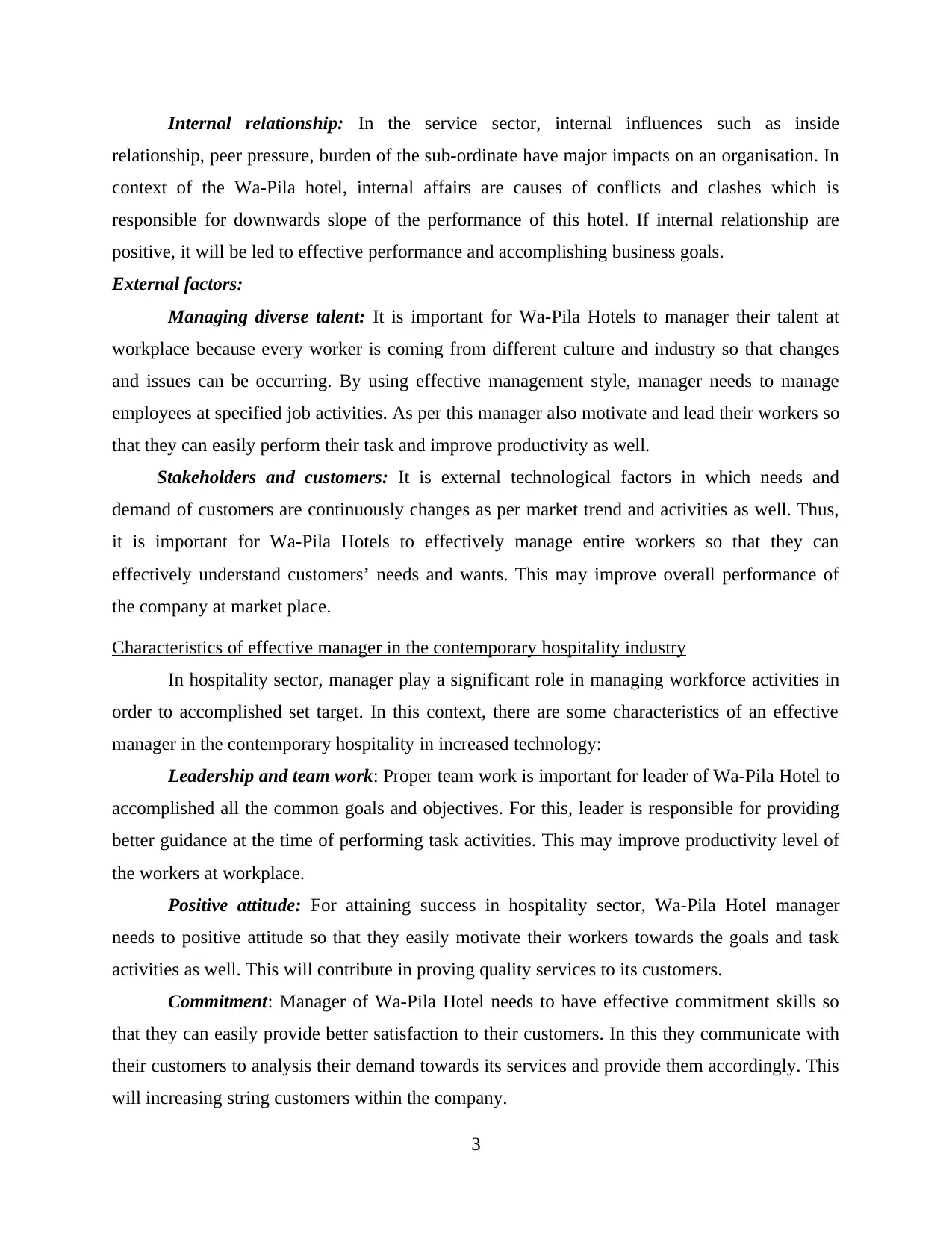
Internal relationship: In the service sector, internal influences such as inside
relationship, peer pressure, burden of the sub-ordinate have major impacts on an organisation. In
context of the Wa-Pila hotel, internal affairs are causes of conflicts and clashes which is
responsible for downwards slope of the performance of this hotel. If internal relationship are
positive, it will be led to effective performance and accomplishing business goals.
External factors:
Managing diverse talent: It is important for Wa-Pila Hotels to manager their talent at
workplace because every worker is coming from different culture and industry so that changes
and issues can be occurring. By using effective management style, manager needs to manage
employees at specified job activities. As per this manager also motivate and lead their workers so
that they can easily perform their task and improve productivity as well.
Stakeholders and customers: It is external technological factors in which needs and
demand of customers are continuously changes as per market trend and activities as well. Thus,
it is important for Wa-Pila Hotels to effectively manage entire workers so that they can
effectively understand customers’ needs and wants. This may improve overall performance of
the company at market place.
Characteristics of effective manager in the contemporary hospitality industry
In hospitality sector, manager play a significant role in managing workforce activities in
order to accomplished set target. In this context, there are some characteristics of an effective
manager in the contemporary hospitality in increased technology:
Leadership and team work: Proper team work is important for leader of Wa-Pila Hotel to
accomplished all the common goals and objectives. For this, leader is responsible for providing
better guidance at the time of performing task activities. This may improve productivity level of
the workers at workplace.
Positive attitude: For attaining success in hospitality sector, Wa-Pila Hotel manager
needs to positive attitude so that they easily motivate their workers towards the goals and task
activities as well. This will contribute in proving quality services to its customers.
Commitment: Manager of Wa-Pila Hotel needs to have effective commitment skills so
that they can easily provide better satisfaction to their customers. In this they communicate with
their customers to analysis their demand towards its services and provide them accordingly. This
will increasing string customers within the company.
3
relationship, peer pressure, burden of the sub-ordinate have major impacts on an organisation. In
context of the Wa-Pila hotel, internal affairs are causes of conflicts and clashes which is
responsible for downwards slope of the performance of this hotel. If internal relationship are
positive, it will be led to effective performance and accomplishing business goals.
External factors:
Managing diverse talent: It is important for Wa-Pila Hotels to manager their talent at
workplace because every worker is coming from different culture and industry so that changes
and issues can be occurring. By using effective management style, manager needs to manage
employees at specified job activities. As per this manager also motivate and lead their workers so
that they can easily perform their task and improve productivity as well.
Stakeholders and customers: It is external technological factors in which needs and
demand of customers are continuously changes as per market trend and activities as well. Thus,
it is important for Wa-Pila Hotels to effectively manage entire workers so that they can
effectively understand customers’ needs and wants. This may improve overall performance of
the company at market place.
Characteristics of effective manager in the contemporary hospitality industry
In hospitality sector, manager play a significant role in managing workforce activities in
order to accomplished set target. In this context, there are some characteristics of an effective
manager in the contemporary hospitality in increased technology:
Leadership and team work: Proper team work is important for leader of Wa-Pila Hotel to
accomplished all the common goals and objectives. For this, leader is responsible for providing
better guidance at the time of performing task activities. This may improve productivity level of
the workers at workplace.
Positive attitude: For attaining success in hospitality sector, Wa-Pila Hotel manager
needs to positive attitude so that they easily motivate their workers towards the goals and task
activities as well. This will contribute in proving quality services to its customers.
Commitment: Manager of Wa-Pila Hotel needs to have effective commitment skills so
that they can easily provide better satisfaction to their customers. In this they communicate with
their customers to analysis their demand towards its services and provide them accordingly. This
will increasing string customers within the company.
3
⊘ This is a preview!⊘
Do you want full access?
Subscribe today to unlock all pages.

Trusted by 1+ million students worldwide
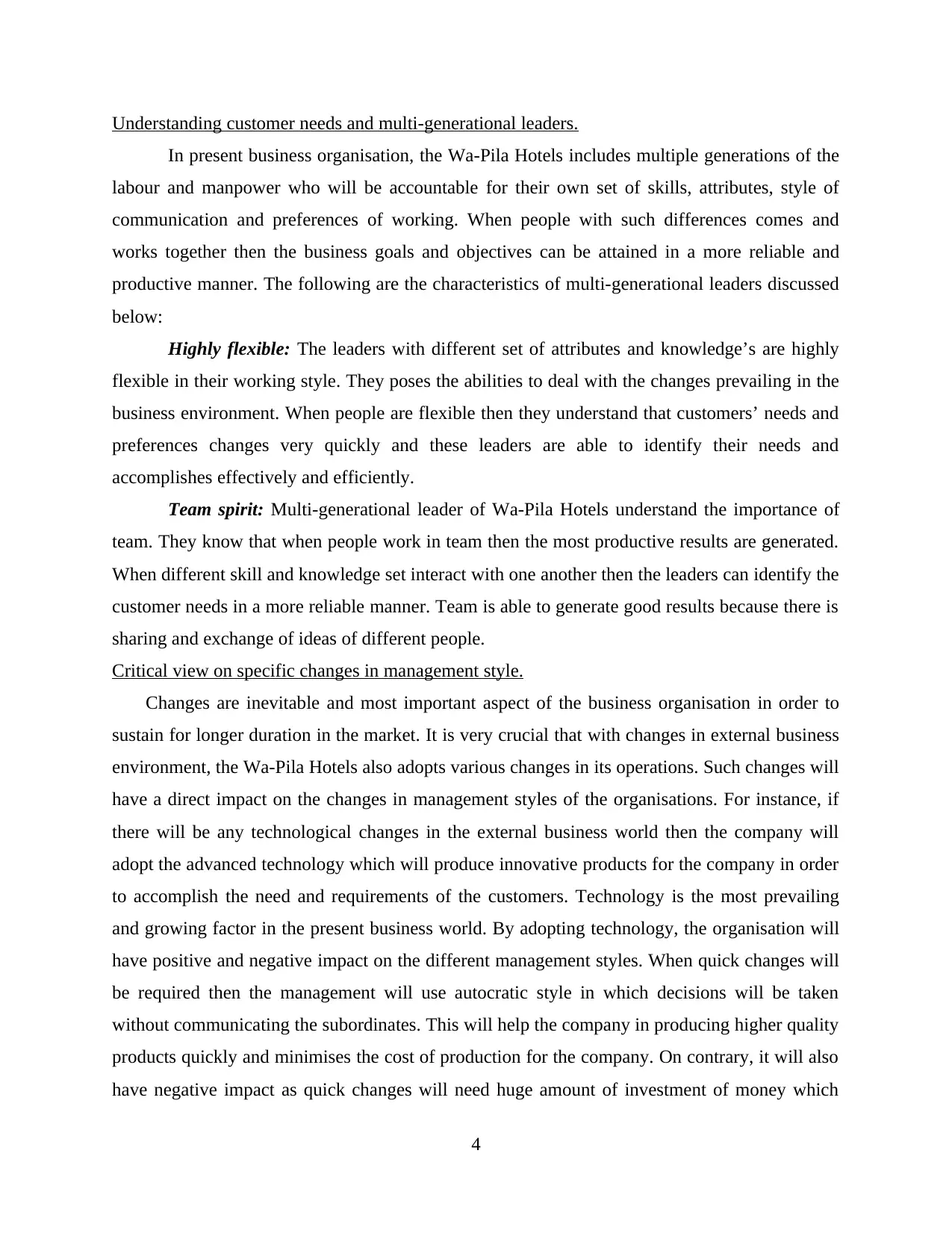
Understanding customer needs and multi-generational leaders.
In present business organisation, the Wa-Pila Hotels includes multiple generations of the
labour and manpower who will be accountable for their own set of skills, attributes, style of
communication and preferences of working. When people with such differences comes and
works together then the business goals and objectives can be attained in a more reliable and
productive manner. The following are the characteristics of multi-generational leaders discussed
below:
Highly flexible: The leaders with different set of attributes and knowledge’s are highly
flexible in their working style. They poses the abilities to deal with the changes prevailing in the
business environment. When people are flexible then they understand that customers’ needs and
preferences changes very quickly and these leaders are able to identify their needs and
accomplishes effectively and efficiently.
Team spirit: Multi-generational leader of Wa-Pila Hotels understand the importance of
team. They know that when people work in team then the most productive results are generated.
When different skill and knowledge set interact with one another then the leaders can identify the
customer needs in a more reliable manner. Team is able to generate good results because there is
sharing and exchange of ideas of different people.
Critical view on specific changes in management style.
Changes are inevitable and most important aspect of the business organisation in order to
sustain for longer duration in the market. It is very crucial that with changes in external business
environment, the Wa-Pila Hotels also adopts various changes in its operations. Such changes will
have a direct impact on the changes in management styles of the organisations. For instance, if
there will be any technological changes in the external business world then the company will
adopt the advanced technology which will produce innovative products for the company in order
to accomplish the need and requirements of the customers. Technology is the most prevailing
and growing factor in the present business world. By adopting technology, the organisation will
have positive and negative impact on the different management styles. When quick changes will
be required then the management will use autocratic style in which decisions will be taken
without communicating the subordinates. This will help the company in producing higher quality
products quickly and minimises the cost of production for the company. On contrary, it will also
have negative impact as quick changes will need huge amount of investment of money which
4
In present business organisation, the Wa-Pila Hotels includes multiple generations of the
labour and manpower who will be accountable for their own set of skills, attributes, style of
communication and preferences of working. When people with such differences comes and
works together then the business goals and objectives can be attained in a more reliable and
productive manner. The following are the characteristics of multi-generational leaders discussed
below:
Highly flexible: The leaders with different set of attributes and knowledge’s are highly
flexible in their working style. They poses the abilities to deal with the changes prevailing in the
business environment. When people are flexible then they understand that customers’ needs and
preferences changes very quickly and these leaders are able to identify their needs and
accomplishes effectively and efficiently.
Team spirit: Multi-generational leader of Wa-Pila Hotels understand the importance of
team. They know that when people work in team then the most productive results are generated.
When different skill and knowledge set interact with one another then the leaders can identify the
customer needs in a more reliable manner. Team is able to generate good results because there is
sharing and exchange of ideas of different people.
Critical view on specific changes in management style.
Changes are inevitable and most important aspect of the business organisation in order to
sustain for longer duration in the market. It is very crucial that with changes in external business
environment, the Wa-Pila Hotels also adopts various changes in its operations. Such changes will
have a direct impact on the changes in management styles of the organisations. For instance, if
there will be any technological changes in the external business world then the company will
adopt the advanced technology which will produce innovative products for the company in order
to accomplish the need and requirements of the customers. Technology is the most prevailing
and growing factor in the present business world. By adopting technology, the organisation will
have positive and negative impact on the different management styles. When quick changes will
be required then the management will use autocratic style in which decisions will be taken
without communicating the subordinates. This will help the company in producing higher quality
products quickly and minimises the cost of production for the company. On contrary, it will also
have negative impact as quick changes will need huge amount of investment of money which
4
Paraphrase This Document
Need a fresh take? Get an instant paraphrase of this document with our AI Paraphraser
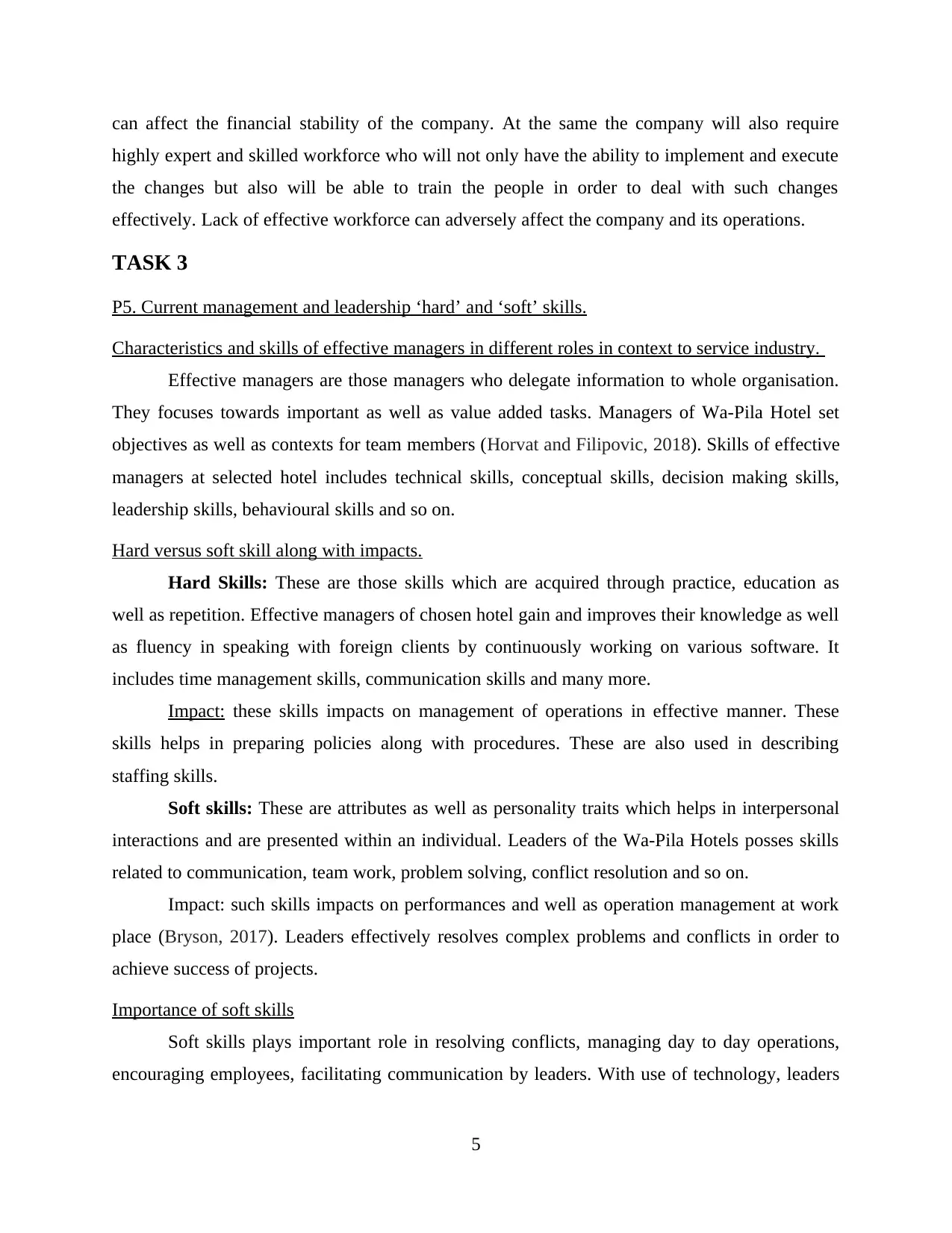
can affect the financial stability of the company. At the same the company will also require
highly expert and skilled workforce who will not only have the ability to implement and execute
the changes but also will be able to train the people in order to deal with such changes
effectively. Lack of effective workforce can adversely affect the company and its operations.
TASK 3
P5. Current management and leadership ‘hard’ and ‘soft’ skills.
Characteristics and skills of effective managers in different roles in context to service industry.
Effective managers are those managers who delegate information to whole organisation.
They focuses towards important as well as value added tasks. Managers of Wa-Pila Hotel set
objectives as well as contexts for team members (Horvat and Filipovic, 2018). Skills of effective
managers at selected hotel includes technical skills, conceptual skills, decision making skills,
leadership skills, behavioural skills and so on.
Hard versus soft skill along with impacts.
Hard Skills: These are those skills which are acquired through practice, education as
well as repetition. Effective managers of chosen hotel gain and improves their knowledge as well
as fluency in speaking with foreign clients by continuously working on various software. It
includes time management skills, communication skills and many more.
Impact: these skills impacts on management of operations in effective manner. These
skills helps in preparing policies along with procedures. These are also used in describing
staffing skills.
Soft skills: These are attributes as well as personality traits which helps in interpersonal
interactions and are presented within an individual. Leaders of the Wa-Pila Hotels posses skills
related to communication, team work, problem solving, conflict resolution and so on.
Impact: such skills impacts on performances and well as operation management at work
place (Bryson, 2017). Leaders effectively resolves complex problems and conflicts in order to
achieve success of projects.
Importance of soft skills
Soft skills plays important role in resolving conflicts, managing day to day operations,
encouraging employees, facilitating communication by leaders. With use of technology, leaders
5
highly expert and skilled workforce who will not only have the ability to implement and execute
the changes but also will be able to train the people in order to deal with such changes
effectively. Lack of effective workforce can adversely affect the company and its operations.
TASK 3
P5. Current management and leadership ‘hard’ and ‘soft’ skills.
Characteristics and skills of effective managers in different roles in context to service industry.
Effective managers are those managers who delegate information to whole organisation.
They focuses towards important as well as value added tasks. Managers of Wa-Pila Hotel set
objectives as well as contexts for team members (Horvat and Filipovic, 2018). Skills of effective
managers at selected hotel includes technical skills, conceptual skills, decision making skills,
leadership skills, behavioural skills and so on.
Hard versus soft skill along with impacts.
Hard Skills: These are those skills which are acquired through practice, education as
well as repetition. Effective managers of chosen hotel gain and improves their knowledge as well
as fluency in speaking with foreign clients by continuously working on various software. It
includes time management skills, communication skills and many more.
Impact: these skills impacts on management of operations in effective manner. These
skills helps in preparing policies along with procedures. These are also used in describing
staffing skills.
Soft skills: These are attributes as well as personality traits which helps in interpersonal
interactions and are presented within an individual. Leaders of the Wa-Pila Hotels posses skills
related to communication, team work, problem solving, conflict resolution and so on.
Impact: such skills impacts on performances and well as operation management at work
place (Bryson, 2017). Leaders effectively resolves complex problems and conflicts in order to
achieve success of projects.
Importance of soft skills
Soft skills plays important role in resolving conflicts, managing day to day operations,
encouraging employees, facilitating communication by leaders. With use of technology, leaders
5
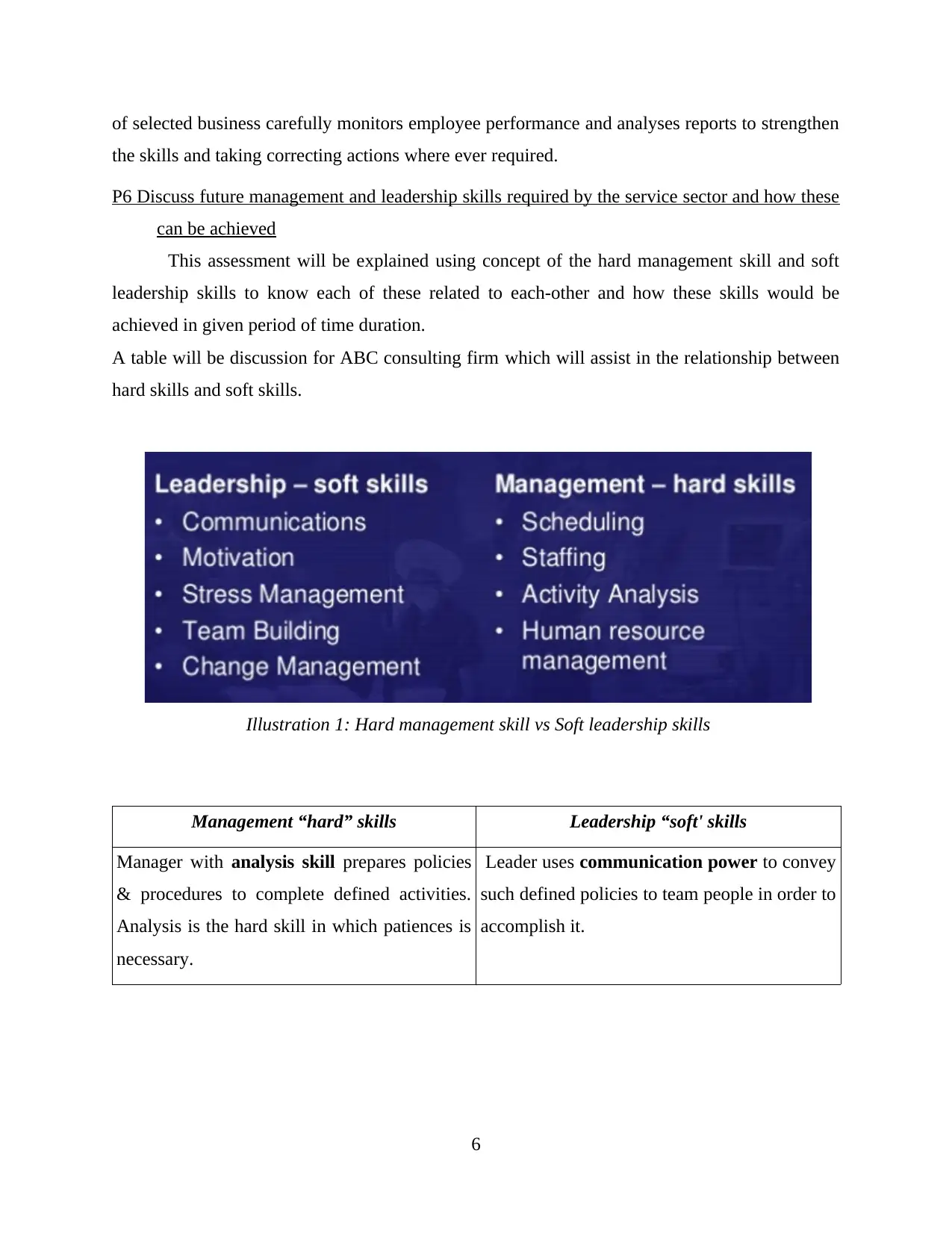
of selected business carefully monitors employee performance and analyses reports to strengthen
the skills and taking correcting actions where ever required.
P6 Discuss future management and leadership skills required by the service sector and how these
can be achieved
This assessment will be explained using concept of the hard management skill and soft
leadership skills to know each of these related to each-other and how these skills would be
achieved in given period of time duration.
A table will be discussion for ABC consulting firm which will assist in the relationship between
hard skills and soft skills.
Illustration 1: Hard management skill vs Soft leadership skills
Management “hard” skills Leadership “soft' skills
Manager with analysis skill prepares policies
& procedures to complete defined activities.
Analysis is the hard skill in which patiences is
necessary.
Leader uses communication power to convey
such defined policies to team people in order to
accomplish it.
6
the skills and taking correcting actions where ever required.
P6 Discuss future management and leadership skills required by the service sector and how these
can be achieved
This assessment will be explained using concept of the hard management skill and soft
leadership skills to know each of these related to each-other and how these skills would be
achieved in given period of time duration.
A table will be discussion for ABC consulting firm which will assist in the relationship between
hard skills and soft skills.
Illustration 1: Hard management skill vs Soft leadership skills
Management “hard” skills Leadership “soft' skills
Manager with analysis skill prepares policies
& procedures to complete defined activities.
Analysis is the hard skill in which patiences is
necessary.
Leader uses communication power to convey
such defined policies to team people in order to
accomplish it.
6
⊘ This is a preview!⊘
Do you want full access?
Subscribe today to unlock all pages.

Trusted by 1+ million students worldwide
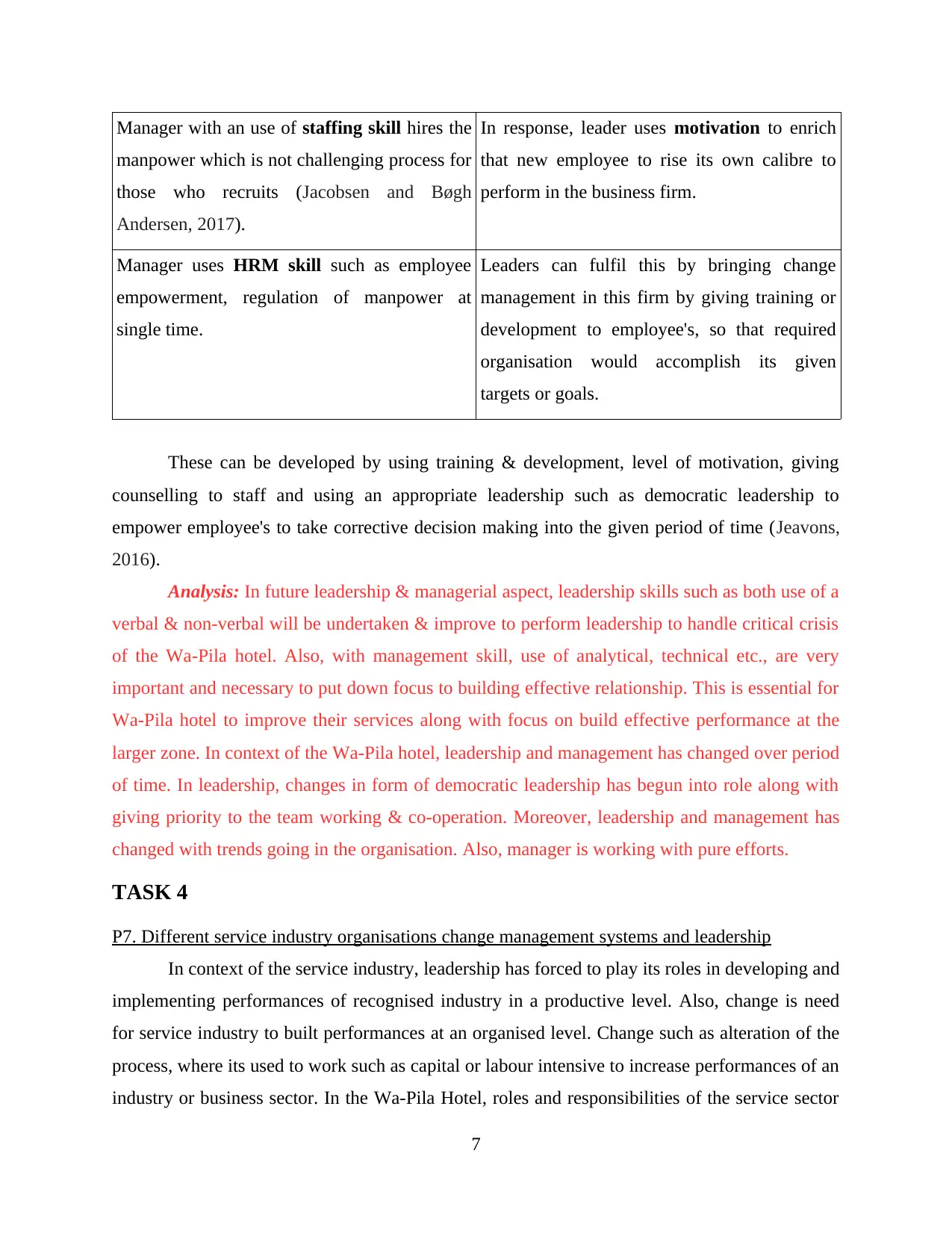
Manager with an use of staffing skill hires the
manpower which is not challenging process for
those who recruits (Jacobsen and Bøgh
Andersen, 2017).
In response, leader uses motivation to enrich
that new employee to rise its own calibre to
perform in the business firm.
Manager uses HRM skill such as employee
empowerment, regulation of manpower at
single time.
Leaders can fulfil this by bringing change
management in this firm by giving training or
development to employee's, so that required
organisation would accomplish its given
targets or goals.
These can be developed by using training & development, level of motivation, giving
counselling to staff and using an appropriate leadership such as democratic leadership to
empower employee's to take corrective decision making into the given period of time (Jeavons,
2016).
Analysis: In future leadership & managerial aspect, leadership skills such as both use of a
verbal & non-verbal will be undertaken & improve to perform leadership to handle critical crisis
of the Wa-Pila hotel. Also, with management skill, use of analytical, technical etc., are very
important and necessary to put down focus to building effective relationship. This is essential for
Wa-Pila hotel to improve their services along with focus on build effective performance at the
larger zone. In context of the Wa-Pila hotel, leadership and management has changed over period
of time. In leadership, changes in form of democratic leadership has begun into role along with
giving priority to the team working & co-operation. Moreover, leadership and management has
changed with trends going in the organisation. Also, manager is working with pure efforts.
TASK 4
P7. Different service industry organisations change management systems and leadership
In context of the service industry, leadership has forced to play its roles in developing and
implementing performances of recognised industry in a productive level. Also, change is need
for service industry to built performances at an organised level. Change such as alteration of the
process, where its used to work such as capital or labour intensive to increase performances of an
industry or business sector. In the Wa-Pila Hotel, roles and responsibilities of the service sector
7
manpower which is not challenging process for
those who recruits (Jacobsen and Bøgh
Andersen, 2017).
In response, leader uses motivation to enrich
that new employee to rise its own calibre to
perform in the business firm.
Manager uses HRM skill such as employee
empowerment, regulation of manpower at
single time.
Leaders can fulfil this by bringing change
management in this firm by giving training or
development to employee's, so that required
organisation would accomplish its given
targets or goals.
These can be developed by using training & development, level of motivation, giving
counselling to staff and using an appropriate leadership such as democratic leadership to
empower employee's to take corrective decision making into the given period of time (Jeavons,
2016).
Analysis: In future leadership & managerial aspect, leadership skills such as both use of a
verbal & non-verbal will be undertaken & improve to perform leadership to handle critical crisis
of the Wa-Pila hotel. Also, with management skill, use of analytical, technical etc., are very
important and necessary to put down focus to building effective relationship. This is essential for
Wa-Pila hotel to improve their services along with focus on build effective performance at the
larger zone. In context of the Wa-Pila hotel, leadership and management has changed over period
of time. In leadership, changes in form of democratic leadership has begun into role along with
giving priority to the team working & co-operation. Moreover, leadership and management has
changed with trends going in the organisation. Also, manager is working with pure efforts.
TASK 4
P7. Different service industry organisations change management systems and leadership
In context of the service industry, leadership has forced to play its roles in developing and
implementing performances of recognised industry in a productive level. Also, change is need
for service industry to built performances at an organised level. Change such as alteration of the
process, where its used to work such as capital or labour intensive to increase performances of an
industry or business sector. In the Wa-Pila Hotel, roles and responsibilities of the service sector
7
Paraphrase This Document
Need a fresh take? Get an instant paraphrase of this document with our AI Paraphraser
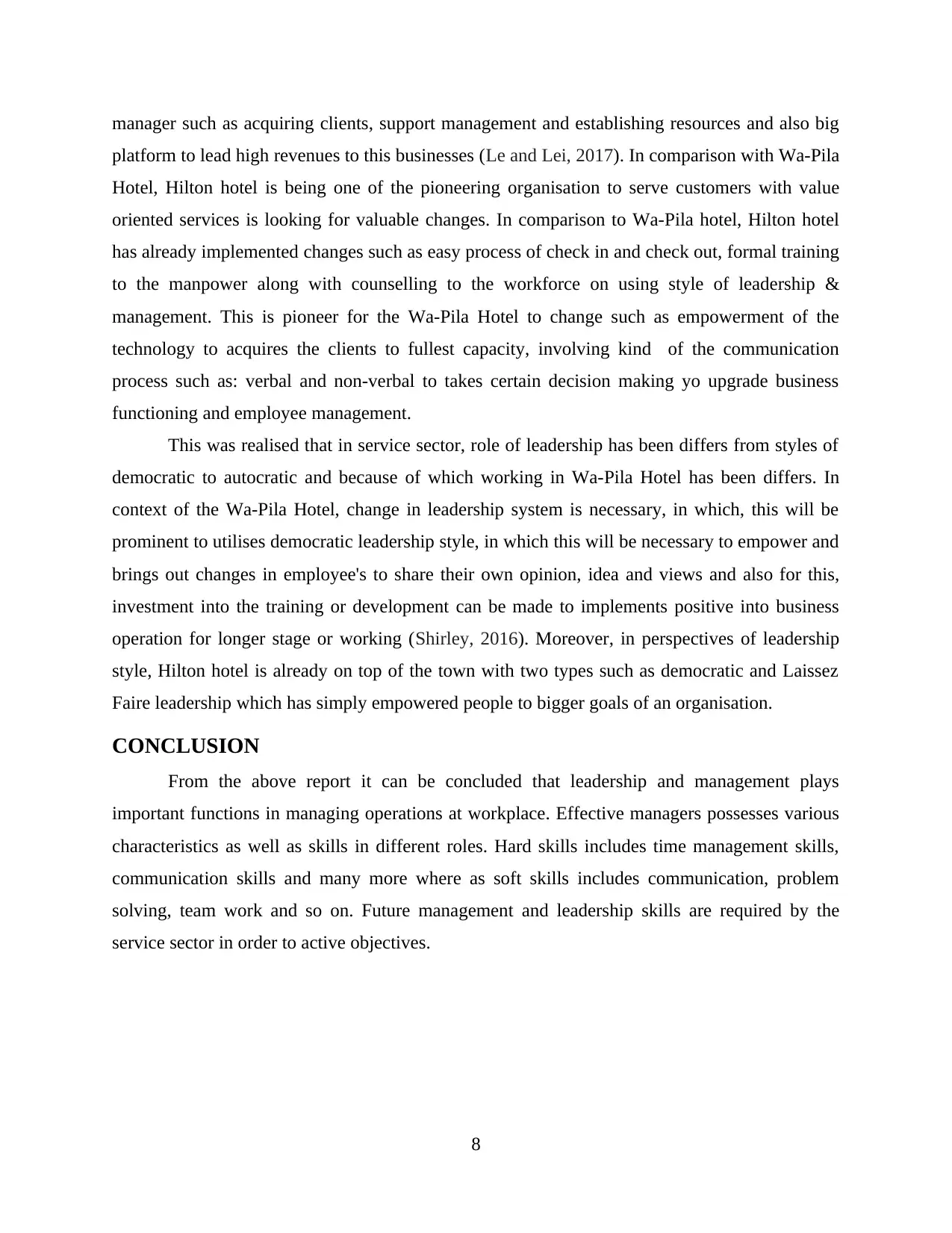
manager such as acquiring clients, support management and establishing resources and also big
platform to lead high revenues to this businesses (Le and Lei, 2017). In comparison with Wa-Pila
Hotel, Hilton hotel is being one of the pioneering organisation to serve customers with value
oriented services is looking for valuable changes. In comparison to Wa-Pila hotel, Hilton hotel
has already implemented changes such as easy process of check in and check out, formal training
to the manpower along with counselling to the workforce on using style of leadership &
management. This is pioneer for the Wa-Pila Hotel to change such as empowerment of the
technology to acquires the clients to fullest capacity, involving kind of the communication
process such as: verbal and non-verbal to takes certain decision making yo upgrade business
functioning and employee management.
This was realised that in service sector, role of leadership has been differs from styles of
democratic to autocratic and because of which working in Wa-Pila Hotel has been differs. In
context of the Wa-Pila Hotel, change in leadership system is necessary, in which, this will be
prominent to utilises democratic leadership style, in which this will be necessary to empower and
brings out changes in employee's to share their own opinion, idea and views and also for this,
investment into the training or development can be made to implements positive into business
operation for longer stage or working (Shirley, 2016). Moreover, in perspectives of leadership
style, Hilton hotel is already on top of the town with two types such as democratic and Laissez
Faire leadership which has simply empowered people to bigger goals of an organisation.
CONCLUSION
From the above report it can be concluded that leadership and management plays
important functions in managing operations at workplace. Effective managers possesses various
characteristics as well as skills in different roles. Hard skills includes time management skills,
communication skills and many more where as soft skills includes communication, problem
solving, team work and so on. Future management and leadership skills are required by the
service sector in order to active objectives.
8
platform to lead high revenues to this businesses (Le and Lei, 2017). In comparison with Wa-Pila
Hotel, Hilton hotel is being one of the pioneering organisation to serve customers with value
oriented services is looking for valuable changes. In comparison to Wa-Pila hotel, Hilton hotel
has already implemented changes such as easy process of check in and check out, formal training
to the manpower along with counselling to the workforce on using style of leadership &
management. This is pioneer for the Wa-Pila Hotel to change such as empowerment of the
technology to acquires the clients to fullest capacity, involving kind of the communication
process such as: verbal and non-verbal to takes certain decision making yo upgrade business
functioning and employee management.
This was realised that in service sector, role of leadership has been differs from styles of
democratic to autocratic and because of which working in Wa-Pila Hotel has been differs. In
context of the Wa-Pila Hotel, change in leadership system is necessary, in which, this will be
prominent to utilises democratic leadership style, in which this will be necessary to empower and
brings out changes in employee's to share their own opinion, idea and views and also for this,
investment into the training or development can be made to implements positive into business
operation for longer stage or working (Shirley, 2016). Moreover, in perspectives of leadership
style, Hilton hotel is already on top of the town with two types such as democratic and Laissez
Faire leadership which has simply empowered people to bigger goals of an organisation.
CONCLUSION
From the above report it can be concluded that leadership and management plays
important functions in managing operations at workplace. Effective managers possesses various
characteristics as well as skills in different roles. Hard skills includes time management skills,
communication skills and many more where as soft skills includes communication, problem
solving, team work and so on. Future management and leadership skills are required by the
service sector in order to active objectives.
8
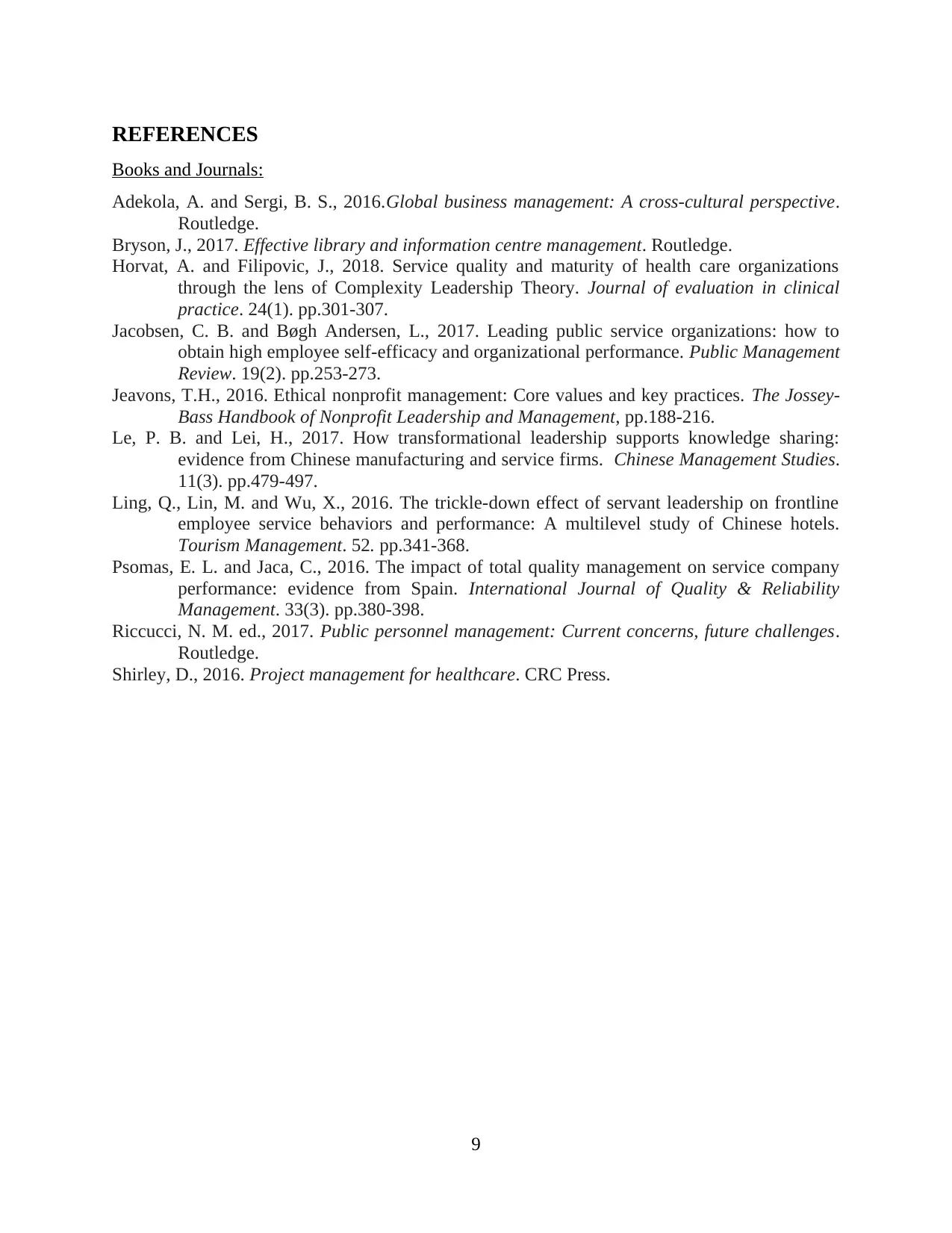
REFERENCES
Books and Journals:
Adekola, A. and Sergi, B. S., 2016.Global business management: A cross-cultural perspective.
Routledge.
Bryson, J., 2017. Effective library and information centre management. Routledge.
Horvat, A. and Filipovic, J., 2018. Service quality and maturity of health care organizations
through the lens of Complexity Leadership Theory. Journal of evaluation in clinical
practice. 24(1). pp.301-307.
Jacobsen, C. B. and Bøgh Andersen, L., 2017. Leading public service organizations: how to
obtain high employee self-efficacy and organizational performance. Public Management
Review. 19(2). pp.253-273.
Jeavons, T.H., 2016. Ethical nonprofit management: Core values and key practices. The Jossey‐
Bass Handbook of Nonprofit Leadership and Management, pp.188-216.
Le, P. B. and Lei, H., 2017. How transformational leadership supports knowledge sharing:
evidence from Chinese manufacturing and service firms. Chinese Management Studies.
11(3). pp.479-497.
Ling, Q., Lin, M. and Wu, X., 2016. The trickle-down effect of servant leadership on frontline
employee service behaviors and performance: A multilevel study of Chinese hotels.
Tourism Management. 52. pp.341-368.
Psomas, E. L. and Jaca, C., 2016. The impact of total quality management on service company
performance: evidence from Spain. International Journal of Quality & Reliability
Management. 33(3). pp.380-398.
Riccucci, N. M. ed., 2017. Public personnel management: Current concerns, future challenges.
Routledge.
Shirley, D., 2016. Project management for healthcare. CRC Press.
9
Books and Journals:
Adekola, A. and Sergi, B. S., 2016.Global business management: A cross-cultural perspective.
Routledge.
Bryson, J., 2017. Effective library and information centre management. Routledge.
Horvat, A. and Filipovic, J., 2018. Service quality and maturity of health care organizations
through the lens of Complexity Leadership Theory. Journal of evaluation in clinical
practice. 24(1). pp.301-307.
Jacobsen, C. B. and Bøgh Andersen, L., 2017. Leading public service organizations: how to
obtain high employee self-efficacy and organizational performance. Public Management
Review. 19(2). pp.253-273.
Jeavons, T.H., 2016. Ethical nonprofit management: Core values and key practices. The Jossey‐
Bass Handbook of Nonprofit Leadership and Management, pp.188-216.
Le, P. B. and Lei, H., 2017. How transformational leadership supports knowledge sharing:
evidence from Chinese manufacturing and service firms. Chinese Management Studies.
11(3). pp.479-497.
Ling, Q., Lin, M. and Wu, X., 2016. The trickle-down effect of servant leadership on frontline
employee service behaviors and performance: A multilevel study of Chinese hotels.
Tourism Management. 52. pp.341-368.
Psomas, E. L. and Jaca, C., 2016. The impact of total quality management on service company
performance: evidence from Spain. International Journal of Quality & Reliability
Management. 33(3). pp.380-398.
Riccucci, N. M. ed., 2017. Public personnel management: Current concerns, future challenges.
Routledge.
Shirley, D., 2016. Project management for healthcare. CRC Press.
9
⊘ This is a preview!⊘
Do you want full access?
Subscribe today to unlock all pages.

Trusted by 1+ million students worldwide
1 out of 13
Related Documents
Your All-in-One AI-Powered Toolkit for Academic Success.
+13062052269
info@desklib.com
Available 24*7 on WhatsApp / Email
![[object Object]](/_next/static/media/star-bottom.7253800d.svg)
Unlock your academic potential
Copyright © 2020–2025 A2Z Services. All Rights Reserved. Developed and managed by ZUCOL.





